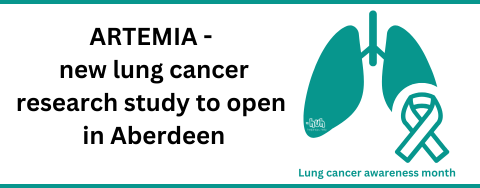Our lung cancer research team works hard to bring new treatments to patients in the North East of Scotland. Dr Gillian Price, Consultant Medical Oncologist in NHS Grampian, said: "We are looking forward to opening the ARTEMIA study and continuing our commitment to research into improving outcomes from lung cancer ".
About the ARTEMIA study [1]: It targets non-small cell lung cancer (NSCLC). NSCLC is the most frequent type of lung cancer (about 85% of lung cancer cases) [2]. The study looks at a new immunotherapy called OSE2101. OSE2101 is a therapeutic cancer vaccine. The study will compare OSE2101 to the current usual treatment (docetaxel). Docetaxel is a well-known and marketed chemotherapy that slows down or stops creation of tumour cells. Docetaxel is already approved for NSCLC if a previous treatment has not worked. OSE2101 is a therapeutic cancer vaccine designed to activate cells in the body that fight cancers. OSE2101 works by binding to HLA-A2 (Human Leucocytes Antigen-A2) receptors. HLA-A2 receptors are present in approximately 45% of the population. Only people whose disease has progressed after their first treatment and who have HLA-A2 receptors can take part in this ARTEMIA research study. Participants will be randomly assigned to receive either OSE2101 or standard of care (docetaxel).
If you like to take part in a medical research study speak to your doctor or healthcare provider.
1 ARTEMIA study details on ClinicalTrials.gov: Study Details | Trial of Therapeutic Cancer Vaccine OSE2101 in Patients With Non-Small Cell Lung Cancer and Secondary Resistance to Immune Checkpoint Inhibitor | ClinicalTrials.gov
2 What is non-small lung cancer: Non-small cell lung cancer (NSCLC) | Macmillan Cancer Support
